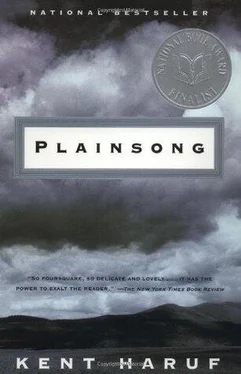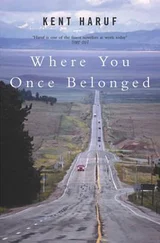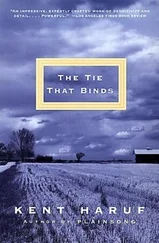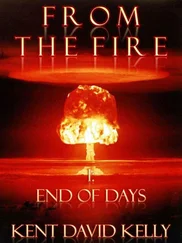They followed her scraping into the kitchen, where they hadn’t been before: a little room with a small window overlooking the tarred roof of the next building, and a plain wood table with a toaster on it, a half-refrigerator, a trash can and an old hard enameled sink containing a single dirty coffee cup and the toast crumbs of her breakfast.
Wash your hands, she said. That’s first. Here.
They stood next to one another before the sink. Afterward she handed them a towel. Then she told them to take down the additional ingredients from the cupboard and set them out on the table, following the order of the old recipe she’d cut from the top of an oatmeal barrel, the recipe gray and worn now, grease-smeared but still legible.
What’s next? she said. Read it.
Vanilla.
Up there. On the middle shelf. Then what?
Baking soda.
There. She pointed. Anything else?
No. That’s all.
All right, she said. You understand? If you can read you can cook. You can always feed yourselves. You remember that. I’m not just talking about here. When you go home too. Do you understand what I’m saying?
They looked at her gravely. Bobby read the scrap of recipe print again. What does cream mean? he said.
Where?
It says cream the butter and sugars.
That means mix them together until they’re soft, she said. Like heavy cream.
Oh.
You use a fork for that.
They began to put it all in and they stirred it together in the bowl while she stood beside them overseeing, instructing, then they spooned dollops of batter onto the greased sheet and set the raw cookies in the oven.
I’ve been thinking, she said. I’m going to show you something. While we wait.
She shuffled into the next room and came back carrying a flat and ragged cardboard box and set it on the table and removed the lid, then she showed them photographs that had been much-handled in the long afternoons and evenings of her solitary life, photographs that had been lifted out and examined and returned to the black picture book album, the album itself of an old shape and style. They were all of her son, Albert. That’s him, she told them. Her tobacco-stained finger pointed at one of the photographs. That’s my son. He died in the war. In the Pacific.
The boys bent forward to see him.
That’s my Albert in his Navy uniform. That’s my favorite picture of him as a grown man. Do you see that look on his face? Oh, he was a handsome boy.
He was a tall thin boy in a dark Navy uniform, wearing his dress blues, and his white dixie cup pushed back on his head, his shoes gleaming. In the picture he was squinting into the sun. Behind him there was a tree in leaf and a pool of dark shade. He was grinning terrifically.
I miss him every day, she said. I still do.
She turned the page and there was a photograph of the same boy standing with his arm draped around the shoulders of a slender woman with dark wavy hair in a white gabardine dress.
Who’s that? they said. That lady with him.
Who do you think? she said.
They shrugged. They didn’t know.
That’s me. Couldn’t you guess?
They turned to look at her, examining her face.
That’s how I used to look, she said. I was young once too, don’t you know.
Her face was close to theirs, old and bespectacled, agespotted; she had soft loose cheeks, her thin hair was pulled back. She smelled of cigarette smoke. They looked again at the picture of her when she was a young woman wearing a handsome white dress in the company of her son.
That was when Albert was home for the last time, she said.
Where was his father? Ike said. Was he home too?
No, he was not. Her voice changed. She sounded bitter and tired now. He was gone by then. His father was nowhere. That’s where he was.
Bobby said, Our mother’s in Denver now.
Oh, she said. She looked at him. Their faces were close. Yes, I think I heard something about that.
Because she was just renting that house, Ike said. She’s in Denver staying with her sister.
I see.
We’ll be going to visit her pretty soon. At Christmastime.
That’ll be good, won’t it. She must miss you terribly. I would. Like breath itself. I know she does too.
She calls on the phone sometimes, Ike said.
The timer dinged on the stove. They took the first oatmeal cookies out of the oven and now there was the smell of cinnamon and fresh baking in the dark little room. The boys sat at the table and ate the cookies together with the milk Mrs. Stearns had poured out into blue glasses. She stood at the counter watching them and sipped at a cup of hot tea and ate a small piece of a cookie, but she wasn’t hungry. After a while she smoked a cigarette and tapped the ashes in the sink.
You boys don’t say very much, she said. I wonder what you’re thinking all the time.
About what?
About anything. About the cookies you made.
They’re good, Ike said.
You can take them home with you, she said.
Don’t you want them?
I’ll keep a few. You take the rest home when you go.
Maggie Jones said, You’re not leaving so soon?
Guthrie stood in the front hall with his winter coat in his hand, while behind Maggie other teachers stood about in groups holding little paper plates of food, drinking and talking, and still others sat in chairs and on the davenport. In the corner of the living room one of them was listening to Maggie Jones’s father. The old man had on a corduroy shirt and a green tie and he was gesturing with both hands, telling the woman something, some story out of his own old time when he was young.
Why so soon? Maggie said. It’s still early.
I’m not much for these things, Guthrie said. I think I’ll go on.
Where are you going?
Over to have a drink at the Chute. Why don’t you come with me.
I can’t leave these people here. You know that.
Guthrie pulled his coat on and zipped it.
Wait for me, she said. I’ll come join you when I can.
All right. But I don’t know how long I’ll be there.
He opened the door and went outside. He felt the cold air at once on his face and ears and inside his nose. There were cars parked all along the street in front of her house and around the corner. He walked up half a block and climbed into his pickup. It turned over grudgingly, then it caught and he shoved his hands in his pockets while it warmed up a minute, then he pulled out into the street. Three blocks south on the almost empty highway he stopped at the Gas and Go, leaving the pickup engine idling, and bought a pack of cigarettes and came back out and drove over a couple of blocks east to the Chute Bar and Grill. It was smoky inside and somebody had fed the jukebox. The usual crowd was there, for a Saturday night.
He sat down at the bar and Monroe came over, drying his hands on a white bar towel. Tom, what’s it going to be? Guthrie ordered a beer and Monroe drew it and set it down in front of him. He wiped at a spot on the polished wood but it was something in the grain of the wood itself. You want to start a tab?
I don’t guess so. Guthrie handed him a bill and Monroe turned and made change at the cash register in front of the big mirror and brought it back and set the bills and coins alongside the glass.
Anything happening?
It’s still early, Monroe said.
He went down the bar and Guthrie looked around. There were three or four men on his left and people at the booths behind them and others in the far room at the tables and booths and at the shuffleboard table against the wall. Judy, the high school secretary, was sitting with another woman at one of the tables. She saw him looking at her and raised her glass and waggled two fingers like a young girl would. He nodded to her and turned and looked the other direction back toward the entrance. A couple more men, and slumped on the end stool was a woman in an army jacket. The man next to him turned. It was Buster Wheelright.
Читать дальше







